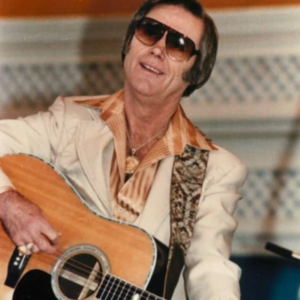
“Where Grass Won’t Grow” is a poignant country ballad recorded by the legendary George Jones in 1971. This song, written by Bill Anderson and Kent Westberry, showcases Jones’s signature emotional delivery and his ability to convey the heartache and longing of a lost love.
The song’s narrative revolves around a man reflecting on a failed relationship and the pain of separation. The imagery of “where grass won’t grow” symbolizes the barrenness and desolation that he feels in his heart. Jones’s voice, filled with raw emotion and vulnerability, captures the depth of the character’s sorrow and regret.
George Jones: A Country Music Icon
George Jones, often referred to as the “Possum,” is a towering figure in country music history. His career spanned over seven decades, during which he recorded numerous hits and solidified his status as one of the genre’s most influential artists. Jones’s distinctive voice, characterized by its vibrato and emotional intensity, set him apart from his contemporaries.
Born in 1931 in Beaumont, Texas, Jones began his musical journey at a young age. He honed his skills in honky-tonks and bars, developing a repertoire that blended traditional country with elements of rockabilly and blues. In the 1950s, he gained recognition with hits such as “White Lightning” and “As I Love You.”
However, Jones’s personal life was often troubled by alcohol abuse and marital problems. His struggles with addiction led to several setbacks in his career, but he always managed to bounce back. In the 1970s, he experienced a resurgence of popularity with albums like “The Grand Tour” and “I’m No Angel.”
The Lyrical Depths of “Where Grass Won’t Grow”
The lyrics of “Where Grass Won’t Grow” delve into the complexities of heartbreak and the enduring power of love. The narrator expresses his longing for his former partner and the memories they shared. He recalls their walks on the beach, the sweetness of their love, and the pain of their separation.
The song’s chorus, with its haunting melody and evocative imagery, encapsulates the narrator’s emotional state:
Where grass won’t grow, that’s where my heart is now A barren place where love has died The sun won’t shine, nor will the flowers grow Since you walked out of my life
The image of a barren landscape mirrors the emptiness that the narrator feels inside. The absence of love has left him desolate and devoid of joy.
The song also explores themes of regret and the longing for a second chance. The narrator acknowledges his mistakes and the pain he has caused his former partner. He yearns for forgiveness and the possibility of reconciliation.
Jones’s Emotional Performance
George Jones’s vocal performance on “Where Grass Won’t Grow” is a masterclass in emotional expression. His voice conveys a range of emotions, from sorrow and regret to longing and hope. He infuses the song with his trademark vibrato and phrasing, creating a sense of intimacy and vulnerability.
Jones’s delivery is particularly poignant in the song’s final verse, where the narrator expresses his unwavering love for his former partner. His voice cracks with emotion as he sings the lines:
Though you may never know, how much I still love you I’ll always cherish the memories we made And though my heart is broken, I’ll never forget you You’ll always be the love of my life
These lines highlight the enduring nature of love and the pain of separation. Jones’s performance captures the raw emotion of the moment, leaving a lasting impression on the listener.
Video
Legacy and Impact
“Where Grass Won’t Grow” remains one of George Jones’s most beloved songs. It showcases his artistry and his ability to connect with audiences on a deep emotional level. The song’s enduring popularity is a testament to its timeless message and Jones’s powerful performance.
Jones’s legacy extends far beyond this single song. He is considered one of the greatest country music singers of all time, and his influence can be heard in the work of countless artists. His music continues to inspire and resonate with audiences of all ages, and his legacy will live on for generations to come.